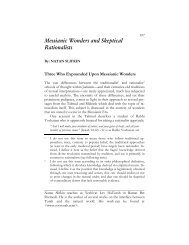Is There a Disconnect between Torah Learning and ... - Hakirah.org
Is There a Disconnect between Torah Learning and ... - Hakirah.org
Is There a Disconnect between Torah Learning and ... - Hakirah.org
Create successful ePaper yourself
Turn your PDF publications into a flip-book with our unique Google optimized e-Paper software.
<strong>Is</strong> there a <strong>Disconnect</strong> <strong>between</strong> <strong>Torah</strong> <strong>Learning</strong> <strong>and</strong> <strong>Torah</strong> Living? : 31<br />
provides a stronger lesson than learning <strong>Torah</strong> from him), <strong>and</strong> the<br />
student always mimics his teachers, <strong>and</strong> in most cases even the<br />
admonishment itself is lacking, when it is mixed with bad character.<br />
What We React to <strong>and</strong> How:<br />
We must react to a poor grade in התנהגות (behavior) on a child’s<br />
report card, no less than to a poor grade in Chumash or Gemara. And<br />
when a child comes home with, for example, a 94 on his/her test,<br />
that should be good enough. We should suppress the urge to ask,<br />
“Was this the best grade in the class?” It teaches the child that the<br />
goal is not to do his best, but to do better than others.<br />
As Rav Samson Raphael Hirsch writes, 31 one of the stressors that<br />
hinder the creation of good middos is the encouragement by home <strong>and</strong><br />
school of an unhealthy kind of competition—one that emphasizes<br />
not being the best one can be, but rather, being better than others. 32<br />
This raises a set of questions. Thus,<br />
• <strong>Is</strong> it healthy, is it Jewish, for us to have a “best Yeshiva” list?<br />
How healthy is it when our בחורים rank the Yeshivas (not to<br />
speak of their ישיבות ,(ראשי <strong>and</strong> their talmidim, as “first” <strong>and</strong><br />
“second” tier schools <strong>and</strong> people? <strong>Is</strong> the emphasis on<br />
attending the “best” schools good <strong>and</strong> healthy? 33<br />
• <strong>Is</strong> the emphasis on being the “best bachur (or girl)” in<br />
wherever, a healthy one? Does it breed good middos? Or, does<br />
it breed a sense of superiority, elitism, <strong>and</strong> arrogance? 34<br />
31 See Hirsch, Rav Samson Raphael, “Ethical Training in the Classroom,”<br />
in Collected Writings of Rabbi Samson Raphael Hirsch, Vol. VII, pp. 49-50.<br />
32 BenZion Sorotzkin addresses this issue in a number of papers. <strong>There</strong><br />
he refers to this negative competition as the unhealthy “quest for<br />
perfection” rather than the healthier “pursuit of excellence.” (See<br />
Sorotzkin, B., “The Pursuit of Perfection: Vice or Virtue in Judaism?”<br />
Journal of Psychology <strong>and</strong> Judaism, Vol. 23, No. 4 179–195 as well as his<br />
other excellent articles on the topic.)<br />
33 See Hirsch, Rav Samson Raphael, On the Collaboration <strong>between</strong> Home<br />
<strong>and</strong> School, ibid. pg 109, on the damage done by “exclusive” schools to<br />
children’s characters.<br />
בבא בתרא ( us 34 Again I hear the reader’s protestations. Do not Chazal tell<br />
, that “jealousy amongst students<br />
קנאת ס ופרים תרבה חכמה :(כא ע "א
















